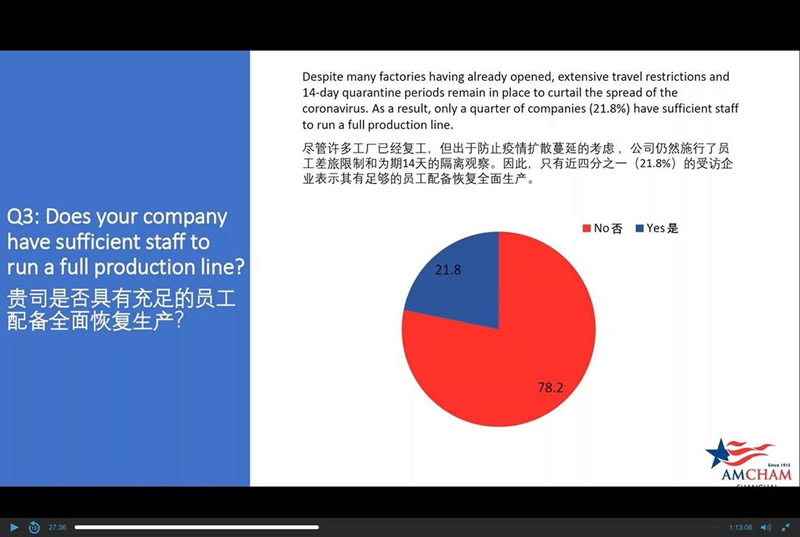If production does not return to full capacity within four weeks, 87% of respondents to an AmCham Shanghai survey on the likely effects of the COVID-19 coronavirus said it would have a direct impact their 2020 revenue, with 24% expecting revenues to fall be more than 16%.
Now that the initial shock caused by the outbreak is abating, we can look beyond the personal risks of contamination and consider the bigger economic picture and the practical issues. It has swiftly become clear that China’s ‘factory of the world’ is already suffering and cannot operate at full capacity. The slide below from the AmCham survey tells the start of the story:

More than 48% of companies surveyed in another AmCham Shanghai survey focusing on supply chains reported that their global operations were already impacted by the shutdown. It had been assumed that the 14-day quarantine (in some places it is only seven days) would be the main issue, but the travel restrictions have turned out to be an even greater problem.
Employees are just not able to travel to work, even if they try. As a result 78% of companies responding said they were currently unable to run a full production line; 41% said a lack of staff would be their biggest challenge over the next month, while 30% of companies said it would be logistics issues.
It might be expected that affected manufacturers would seek to become less reliant on China by diversifying their supply chains. The research, however, does not support this. Global supply chains in which China takes up the biggest part are now so well integrated that they cannot easily be replicated elsewhere.
Some sectors of the Chinese economy have been harder hit than others:
- Entertainment – The entertainment and the food and beverages (F&B) sectors have been heavily affected according to many reports, with local regulations driving many closures. Major international brands like Starbucks, McDonalds and Burger King have temporarily shuttered many outlets, while Disney closed its theme parks in Shanghai and Hong Kong. These are the big names, but many smaller shops have also been heavily affected and the end is not yet in sight.
- Travel – China is the single largest outbound travel market in the world. Chinese tourists made 150 million outbound trips in 2018, spending US$277 billion in their travels abroad. The top 10 destinations for mainland Chinese travelers were all in Asia; that means places like Thailand, Japan, South Korea, Vietnam, Hong Kong and Macao. Coronavirus has brought the travel boom to a screeching halt and it could be years before the global tourism industry recovers.
- Logistics – Shipping and logistics companies have reported higher closure rates than the national average as cities are locked down and travel restriction put in place. The ripple effects of this severe disruption will be felt through global supply chains for months to come. Some interesting details also came to light during the AmCham survey. It seems that a large and significant portion of China’s truck drivers come for Hubei province. which this will be documented on their driver’s licence. As a result a disproportionate number of drivers have been unable to work.
Sovereign China
Sovereign China appears to fit nicely into the AmCham survey, which found that 60% of respondents were planning a mandatory work from home policy for their staff, while almost 90% offering optional work from home. We have not made it mandatory but most staff have opted to work from home. We have also been ‘lucky’. Last year we moved many of our operations to the cloud and this has enabled us to keep serving our clients easily. Other business may not have that luxury.
Is there any light at the end of the tunnel? Yes, of course. Sunshine comes after rain. After the 2002 SARS epidemic, three out of the five hardest hit sectors – airlines, diversified financial services and software – moved to the top-five of the best. So be ready to take maximum advantage when this happens, you maybe able to make up any losses. The sectors that we would expect to rebound the most include transportation, tourism, leisure and luxury good-related businesses.
Also remember that during SARS, the founder of JD Group Liu Qiangdong moved his shop online. Now it is the biggest online retailer in China. Opportunities are always and everywhere.
